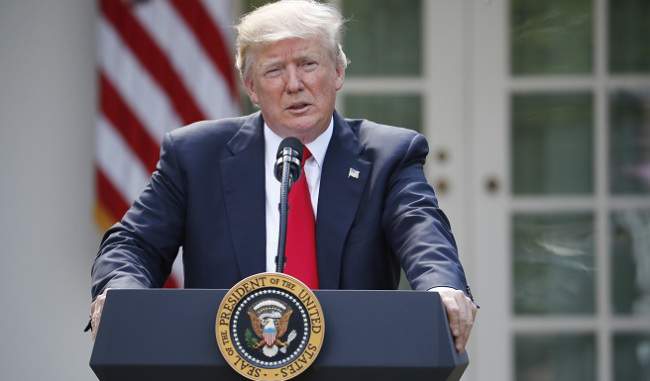
President Trump may have signalled the US withdrawal from the Paris climate change agreement, but there is still reason to hope, says Christopher Jackson
Unless the scientific community is indeed engaged – as Republicans seem to think – in a climate change conspiracy of exceptionally esoteric intent, then this week’s statement from President Donald Trump will go down as a miserable day in human history. President Trump – not necessarily a man noted for his scientific education – stood in the rose-garden at the White House, and announced that he was prepared to pull out of or, alternatively, negotiate a new Paris agreement.
It was another window into the mind of the president. The suggestion of withdrawal, one imagines, was for the benefit of the likes of Steve Bannon, Trump’s unlovely chief of staff. The prospect of some subsequent renegotiation was designed for the ears of his more climate-conscious First Daughter, Ivanka. Trump’s White House is already divided on just about everything.
But even so, the 45th president is a man driven to produce moments of forceful theatre while also knowing very little about policy: as a result he ends up being equivocal and dogmatic at precisely the same time. He is now not so much a president as a psychiatric experiment the world is watching with terrified fascination. And now he is picking a fight against this, and all future generations.
To recap: in 2015, after years of disappointment for climate change campaigners, President Barack Obama – three words to be uttered with ever-increasing nostalgia nowadays – led the way in securing agreement between 195 countries to mitigate their greenhouse gas emissions. It was a salutary recognition of the scale and urgency of the problem: it was also, you might argue, an example of the Enlightenment in action. The goal was to keep global temperatures ‘well below’ 2C above pre-industrial levels and ‘endeavour to limit’ them even more, to 1.5C.
But making his announcement, Trump called it a bad deal. Trump’s narcissism seems to be continually engendering the suspicion that the world isn’t treating him correctly, and this always seems to be incarnating itself in ‘bad deals’. He looks at the world as a bad deal. It is a businessman’s reflection, perhaps – but it is also a fantasist’s affliction. The irony of it all is that Obama’s deal was tailored to suit his country’s needs – for instance, in its insistence that the US set its own targets.
Besides, Trump’s televised ramblings will not bring back the coal industry. There are around three million jobs in the US clean technology sector compared to only a few hundred thousand in the coal sector. The president is seeking to reverse the irreversible – just as, in other areas of policy, he seeks to build the unbuildable (‘We’re gonna build a wall and make Mexico pay for it’), do the extremely unlikely (‘We’re gonna scrap Obamacare and replace it with something amazing for much less money’), and move the very-difficult-to-move (‘We will move the American embassy to the eternal capital of the Jewish people, Jerusalem’).
All that Trump’s decision on the Paris agreement does is to increase America’s isolation. So recently admired when under the stewardship of an internationally popular president, the country is now retrenching – and on climate, it doesn’t feel like any ‘great again’ America which others will seek to emulate. As Rob Bailey, Energy, Environment and Resources Research Director at Chatham House, says: ‘I don’t expect a domino effect from this. Among the world’s biggest emitters in the world – China, the EU, India and even Russia – all have said that they are going to stand by the Paris agreement, so we are likely to see the world recommit to Paris instead of following the American example.’
Trump is also more isolated than he supposes in his own country. New York and California will not reverse their green regulations. And though payments to the UN Green Climate Fund will stop, the movement of markets will not. According to a recent National Renewable Energy Lab report, the cost of installing solar has fallen from $7.06 per watt in 2009 to $2.93 in 2016. That’s a precipitous fall that hats, slogans and tweets can’t change.
Many have been waiting for the moment when Trump finally went too far. There have been false dawns. But this is an area where people feel strongly – especially if, unlike Trump, they mind more about their children’s futures than their own. Elon Musk has already departed all presidential councils, saying that ‘Climate change is real.’ And watch out in the coming years for Michael Bloomberg, a man with possible presidential ambitions, who has recently co-authored a book Climate of Hope, which looks at possible ways to tackle the problem at the local level.
So there’s a silver lining to this ominous cloud: there are those who have supported Trump because they wish to see a change to the corporation tax, which at 35 per cent is indeed arguably too high. But Trump might find that people have one priority greater than the economy – the health of the roses and the prevailing temperature, for instance, in that garden where he made this most absurd of announcements.
Christopher Jackson is head of the Spear’s Research Unit






